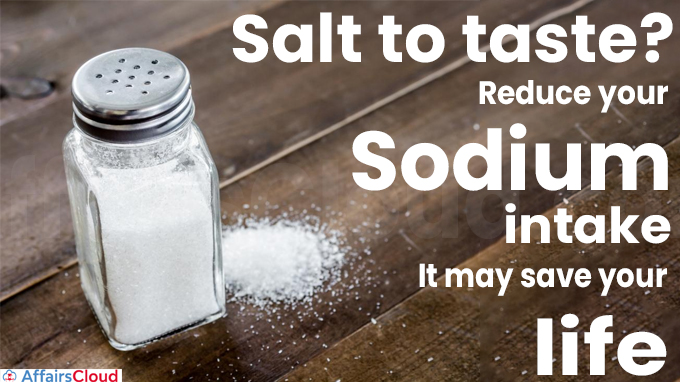
The World Health Organization (WHO) Global Report On Sodium Intake Reduction states that nations must make “massive efforts” to get people to consume less salt, which can lower their risk of developing cancer, heart disease, and stroke.
- The WHO remarked in its first-of-its-kind global report on sodium intake reduction that the world is falling short of its global target of reducing sodium intake by 30% by 2025.
‘WHO Global Report On Sodium Intake Reduction’
i.For the first time, a Sodium Country Score is assigned to each Member State based on the level of implementation of sodium reduction policies and other measures, ranging from 1 (the lowest level) to 4 (the highest level).
- The Sodium Country Score is intended to measure the effect of policy progress on dietary sodium intake and cardiovascular disease in the population.
- As per the report, India’s Sodium intake is about 9.8 g salt/day and its Sodium Country Score was 2.
ii.With no further interventions being implemented in the WHO African Region and among low-income countries, 56 of the 194 WHO member states remain in score 1 on the sodium country scorecard.
- With the implementation of either mandatory or voluntary policies and other measures, 98 countries achieved higher scores.
Sodium & Its Source Sodium Chloride (Table Salt)
i.Sodium is an essential nutrient, which increases the risk of heart disease, stroke, and premature death when eaten in excess.
- Table salt (Sodium Chloride – NaCl) is the most common source of sodium, however it is also found in other condiments such as sodium glutamate.
ii.The WHO recommends less than 5 grams of salt per day (one teaspoon), whereas the average salt intake worldwide is estimated to be 10.8 grams per day.
iii.Research has also found a link between high sodium intake and a higher risk of various ailments, including obesity, osteoporosis, kidney disease, and gastric cancer.
Major Concerns Raised in the Report:
i.According to the report, just 5% of WHO Member States are protected by mandatory and comprehensive sodium reduction policies, and 73% including India lack full implementation of such policies.
ii.An estimated 7 million lives could be saved worldwide by the implementation of highly cost-effective sodium reduction policies by 2030.
- It acts as a critical component of achieving the Sustainable Development Goal (SDG) [Target 3.4] aim of reducing non-communicable disease (NCD) fatalities.
iii.However, only 9 countries currently have a comprehensive set of recommended policies to reduce sodium intake, which include: Brazil, Chile, the Czech Republic, Lithuania, Malaysia, Mexico, Saudi Arabia, Spain, and Uruguay.
Related Facts:
i.Nutrition Advocacy in Public Interest (NAPi) is a national think-tank on nutrition.
ii.The term ‘Front of Pack Nutrition Labelling’ (FOPNL) refers to nutrition labelling systems that are displayed on the front of food packages.
- It is meant to assist consumers in making healthier food choices at the point of purchase by providing simplified and at-a-glance nutritional information.
Recent Related News:
According to the report titled “Trends in maternal mortality 2000 to 2020” produced by World Health Organization (WHO), which tracks maternal deaths nationally, regionally and globally from 2000 to 2020, it was estimated that around 287 000 women died from a maternal cause in 2020, which is approximately 800 deaths every day and one every 2 minutes.
About World Health Organization (WHO):
Director-General – Dr Tedros Adhanom Ghebreyesus
Establishment – 1948
Headquarters – Geneva, Switzerland




